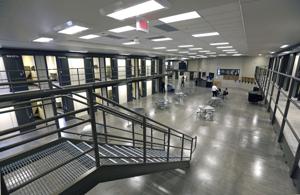Pennsylvania redistricting commission approves prisoner reallocation policy

(The Center Square) – Up to 37,000 inmates housed at state prisons will now be counted as residents in their hometowns as Pennsylvania redraws its House and Senate district maps.
The Legislative Reapportionment Commission voted, 3-2, on Tuesday to adopt the new policy proposed by House Democratic Leader Joanna McClinton, D-Philadelphia, who said prison “gerrymandering” adversely impacts communities of color.
“It makes no sense to count incarcerated individuals in the facilities they’re being held because they’re not able to participate in those communities,” she said.
Senate Democratic Leader Jay Costa, D-Pittsburgh, and Commission Chairman Mark Nordernberg, former chancellor at the University of Pittsburgh, agreed.
“By not doing the prisoner reallocation, it ultimately results in unfairness in terms of and in regards to people in those districts,” Costa said Tuesday.
An analysis from the Vera Institute of Justice concluded that up to 47% of inmates at state prisons in 2017 were Black, despite representing just 11% of the total population overall.
About one in four incarcerated individuals reside in a Philadelphia County facility, according to The Associated Press. An additional 6.5% are housed in Allegheny County, with the rest scattered across 21 other counties.
Federal and county prisoners remain unaffected by the policy change, as do inmates who lived out of state at the time of their arrest. Congressional redistricting will not be impacted, either.
House Majority Leader Kerry Benninghoff, R-Bellefonte, and Senate Majority Leader Kim Ward, R-Greensburg, both voted against the proposal, with the former warning that it may jeopardize the state’s timeline to finalize new maps ahead of next year’s elections.
“By its own admission, this plan is still a work in progress and gives no certainty to when we might have final redistricting data to begin drawing maps,” Benninghoff said, suggesting instead that it be decided through constitutional amendment or the legislative process.
Benninghoff also complained that the policy, which he called “seriously flawed,” results in unequal treatment of prisoners and others in “group quarter settings.”
“Given today’s decision by a majority of the commission, and the further delay prisoner reallocation will cause in finalizing population data, I now have serious concerns about the ability for the Legislative Reapportionment Commission to finalize maps on a timeline that would not impact the 2022 primary election date,” he said.
Ward questioned the fairness of the policy and pointed toward the way the state counts college students as residents “where they learn.”
“They [inmates] really are [there] because they committed a crime and they’ve been convicted of a crime,” she said. “They lost their right to choose where they live.”
Disclaimer: This content is distributed by The Center Square
